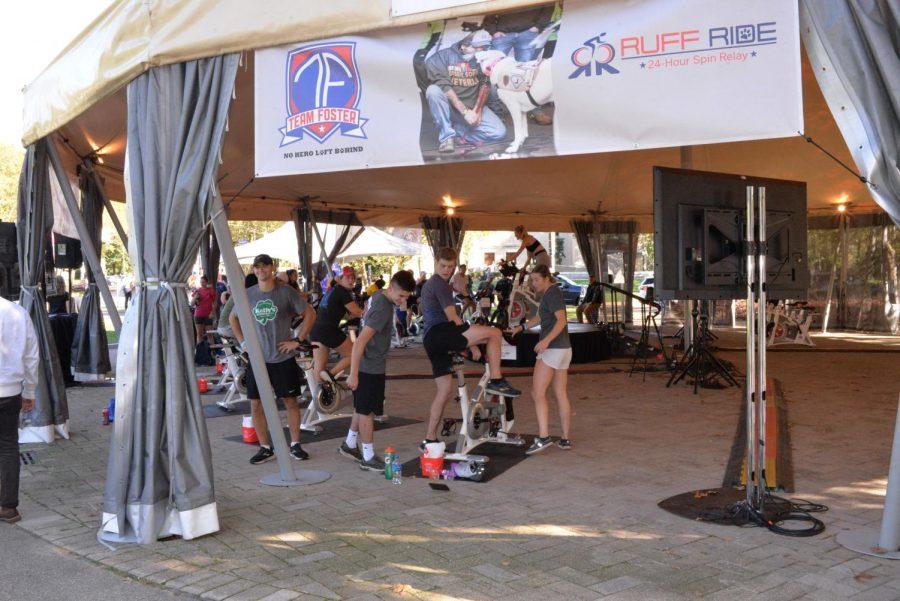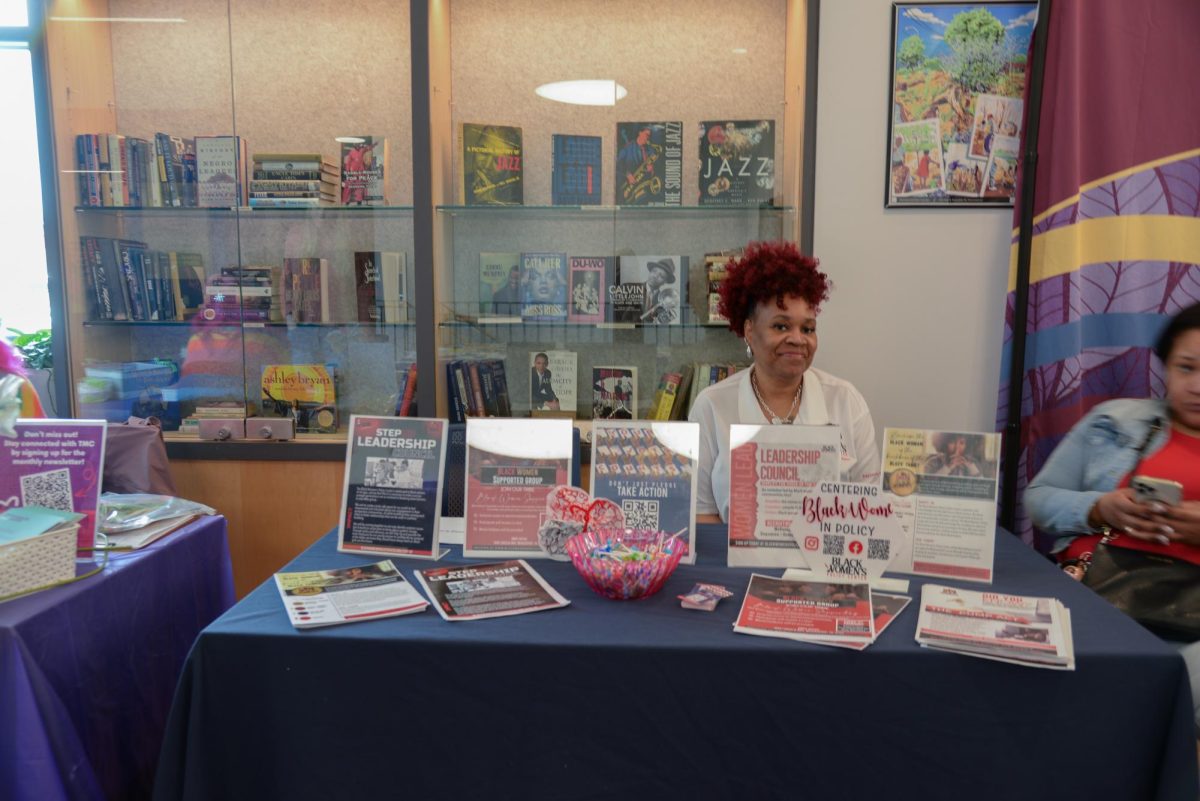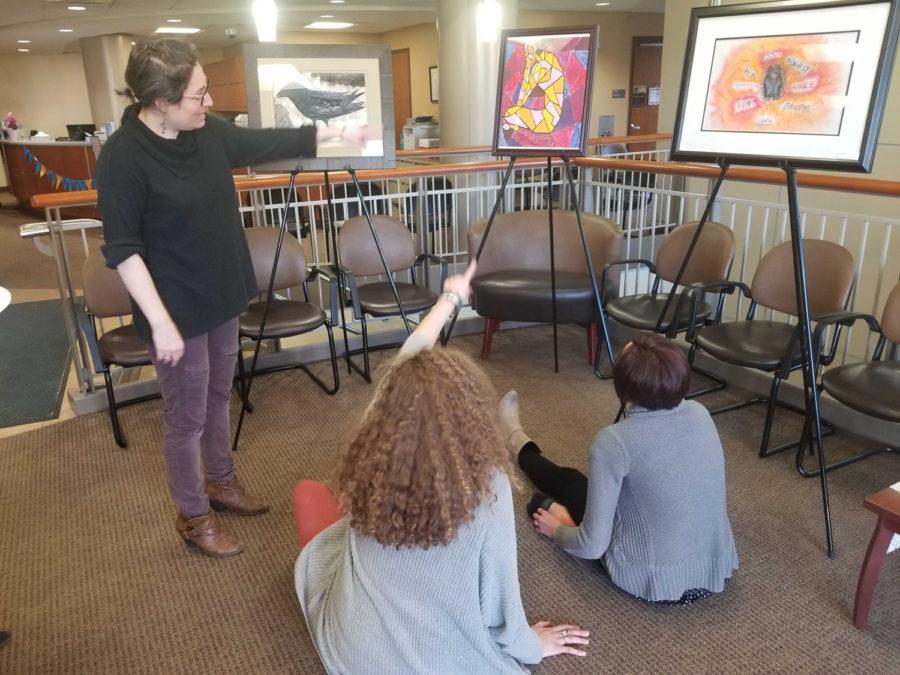Team Foster’s Ruff Ride: 24-Hour Spin Relay holds inaugural Pittsburgh event
Aaiush Jain | Staff Photographer
The Team Foster Ruff Ride 24-hour spin relay came to Pittsburgh for the first time in the organization’s history on Friday underneath the tent at Schenley Plaza.
September 27, 2021
Team Foster founder and Class of 2000 Pitt graduate Nick Liermann stood onstage and glanced down at the row of cyclists warming up in front of him. In just 15 minutes, 11 teams — each with their own assigned spin bike — would begin pedaling their bikes for 24 hours straight. Liermann started off his opening ceremony speech with a simple question.
“Who here has no idea what they’re actually getting into today?” Liermann asked with a grin.
The Team Foster Ruff Ride 24-hour spin relay came to Pittsburgh for the first time in the organization’s history on Friday underneath the tent at Schenley Plaza. The host, Team Foster, is an organization which helps fund service dog programs for veterans with PTSD along with other mental and physical disabilities. Past fundraising events hosted by the nonprofit all took place in southeast Pennsylvania and New Jersey — near their headquarters in Philadelphia.
As the main sponsor, CycleBar Robinson — a spin studio located in Pittsburgh — provided equipment and instructors. With their help, Team Foster cut the tape on their first Pittsburgh Ruff Ride. Liermann handed the microphone over to the spin instructor as the first rider for every team mounted their bikes at noon on Friday.
The rules of the event were simple — teams must ride for as long and far as they can over a 24-hour period starting at noon on Friday and ending at noon on Saturday. There were no limits on the number of times a team could switch riders, and everyone’s progress was tracked real time and posted on screens around the venue.
Over the 24-hour period, there were different challenges and classes designed to keep the event engaging for everyone. The most notable challenge took place from 3:00 to 3:30 a.m. on Saturday. In that 30-minute timeframe, Liermann said he would hop on a bike and challenge all teams to go further than him. If anyone was to defeat him, they would automatically win $250 straight out of his own pocket.
Senior chemical engineering major Trevor Keefer said that the 3 a.m. challenge was the point in the 24-hours he looked forward to most. The same could be said for the other contestants, who let out a collective cheer when Liermann threw down the gauntlet in the opening ceremony.
“Farthest rider gets 250 bucks’ cash, so I’d also like to walk out of here with a little bit of money,” Keefer said. “That’s not what I’m here for, but as for the spin itself goes, that’s what I’m here for.”
Liermann said he founded Team Foster in the memory of Army Captain Erick Foster — an Oil City, Pennsylvania, native and Duquesne graduate who passed away from injuries sustained during his deployment to Iraq in 2007. Liermann said it was Captain Foster’s drive and team mindset that inspired him to use relay endurance challenges as fundraisers for the organization.
“Team Foster was founded to remember him and carry on his legacy,” Liermann said. “His legacy is one of pushing himself and everyone around him.”
The money raised from Team Foster’s events goes toward obtaining, training and providing service dogs for veterans suffering from psychological trauma or brain damage as a result of their service. It can take up to two years and more than $25,000 to properly train these dogs.
According to Liermann, providing service dogs to veterans in need can make a life-saving difference.
“More than 20 veterans every single day lose the battle to suicide,” Liermann said. “These
service dogs, some of which are here already, literally save lives.”
Participants and spectators showed their strong support for Team Foster with many repping branded gear or military T-shirts. People also made it a priority to go up and have conversations with the veterans with service dogs in attendance — something Liermann encouraged in his opening message.
For many of the riders and onlookers, there was a vested interest. Keefer acknowledged that his involvement in the event comes from a place of personal experience.
“I come from a veteran family, I do have a family member who suffers from post-traumatic stress disorder,” Keefer said. “For me it’s just a personal motivation to come out here and try to do something good and raise money for that.”
One of the organizations that Team Foster pledges money to is Susquehanna Service Dogs — a program based out of Grantville, Pennsylvania that prepares service dogs to assist both children and adults with eligible disabilities. Veterans are just one of the many groups of people that are eligible to receive assistance from their service dogs.
According to volunteer dog trainer Jane Jackson, who represented Susquehanna Service Dogs at the event, Team Foster’s donations allowed her organization to further extend their outreach outside of central Pennsylvania in the five years they’ve been partners.
“Team Foster has helped us set up a Philadelphia raising program,” Jackson said. “We’ve attended every Team Foster event so far and now that they’ve moved into Pittsburgh, we’re here as well.”
For just their first event in Pittsburgh, Liermann announced to the crowd that he was very pleased with the amount of people participating in the event. He proudly mentioned in his opening speech that the events had gone “gangbusters” in Philadelphia, referencing their growth in participation year after year. According to Liermann, the plan for Team Foster is to continually expand into other parts of the country.
“Moving into Pittsburgh was the next step,” Liermann said. “We’re likely to be in D.C. and other places moving forward into 2022.”
Liermann emphasized that he’s been looking forward to bringing Ruff Ride back to his roots, and the place where it all started for both him and Captain Foster.
“Coming to Pittsburgh is like coming home,” Liermann said. “I’m a proud Pitt alum, I’m a proud Army veteran, and we knew we wanted to expand, we knew we wanted to impact more veterans, and the natural place to do it is right here at Pitt.”




